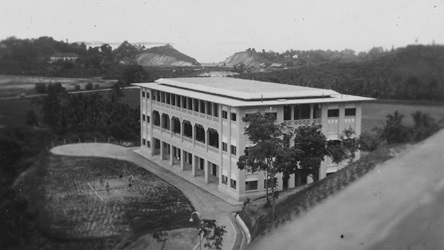Listening, With Heart: Making Land Acquisition Kinder For All
Land acquisition officers, also known as collectors, have it tough. The Singapore Land Authority (SLA)’s Director for Land Acquisition Thong Wai Lin shares what her team does and how the government has made land acquisition fairer since 2007.

Ms Thong Wai Lin grew up with stories of hardship encountered by owners affected by land acquisition, a process whereby privately-owned land is acquired by the government for public works or development. Years later, she jumped at the opportunity to change how this difficult and sensitive work is done. Since then Ms Thong has been part of a team to introduce key changes, including the amendment of the law to allow market value compensation to landowners, and to inculcate greater empathy among officers.
I joined Land Office (now known as SLA) in 1997 and was seconded to the Ministry of Law (MinLaw) in 1999. I stayed there for 10 years. In 2009, I came back to SLA and took on the Lease Management department, and later the Land Sale & Acquisition division in 2010.
Land Acquisition is the most challenging portfolio for me. We have to deal with owners, who understandably are very unhappy when the government comes in to take away their property.
I know of people whose farmlands were acquired in the past. They went through the era when compensation tended to be lower because Singapore wasn’t developed economically yet.
When I was seconded to MinLaw, then Deputy Prime Minister S Jayakumar [also Law Minister] went around the table, asking what young officers would like to change. I suggested, “I think we should change the Land Acquisition Act.”
I gave my views. He was supportive, and said, “Why don’t you do a comprehensive review?” Since then land acquisition has been my “baby”.
The law hadn’t been changed much since it was enacted in the 1960s and we were very concerned about the impact it would have, so the review took time. But in 2007 we moved to amend the law.
We amended the Act to pay market value compensation by dropping provisions that impact compensation, such as one that said the amount would be “whichever is the lower”, referring to the value of the land on either January 1, 1995 (the statutory date) or the [day the acquisition was announced].
Owners were naturally aggrieved with these “whichever is lower” provisions in the legislation that adversely impacted the compensation.
You’d be surprised – some are not even aware that we have paid market value since 2007. So whenever we have the opportunity, we meet up with landowners to make it a point to know each and every one of them. And we’ll tell them, “The legislation has since changed and we now pay market value.”
Besides the compensation amount, it’s also how you communicate and interact with them. I have heard of stories that previously when the acquisition notice was served, there was little communication.
We have moved away from that. Instead of minimising contact, we maximise the touchpoints we have.
Today, we meet up with these owners regularly to understand their concerns. Many a time, they just want a listening ear. They will be sharing with you their difficulties because for most of them, this is their single most expensive investment.
Before a major acquisition, I would go down to have a better sense of the profile of the owners and tenants (of commercial properties) to see what kind of businesses they are in and if they would be able to survive in another location. We try to anticipate the problems they will encounter.
I would lose sleep for every major exercise because I’d be thinking: what can we do to help? We do tailor assistance schemes for those affected.
When we serve the acquisition notice, we assure them, “This is the collector you will be dealing with. And he or she will be with you throughout. This is the contact number of the collector you can reach easily.”
During the first week of acquisition, my collectors will divert their office lines to their mobile phones as well. Because for that initial period, the landowners may be in a state of shock, and you want to make sure they can go to the right person to ask questions.

The acquisition process is new to the affected owners. They’ll be, for the first time, learning technical terms. The collectors will guide the owners through the process and walk the journey with them from the day the notice is served to the day the property is handed over to the State.
Because of the nature of the work, we need people who have patience, perseverance and above all, empathy. We also look for people who are able to speak dialects because you need to break the language barrier.
When we acquired Pearls Centre, many of the old folks living there couldn’t speak Mandarin or English at all. Whenever we had meetings with the old folks, it would be conducted in Cantonese.
The first time I shook hands with a resident from Pearls Centre, his first sentence was in Cantonese. When I replied in Cantonese, it immediately calmed him down.
It’s very hard to recruit. When we tell candidates about the nature of the job, they don’t want to join us. One told me: “It’s sai kang (a tough job), I don’t want to do it.”
In the past, we had collectors who were chased by dogs. Or sometimes the landowners would throw their rubbish deliberately in front of the collectors. Now they just scold us. (laughs)
Another problem is the high turnover rate. It is emotionally draining on my collectors. Some of the landowners will tell us their situation and there are certain times when we cannot go beyond the rules to help them, and we have to tell them “no”.
Some owners can be difficult after hearing your “no”, which I don’t blame them for, but in the process it can be quite disheartening for my collectors. As a result, I have to rotate my collectors after an average of two years.
I also look for people with big hearts – people who don’t draw boundaries – because this job requires you to do a lot of liaising with other government agencies.
There are times when I do feel down, especially when you know you have gone through a lot but the owners still think you have not done enough to help them. I think those do affect us, I have to admit.
But the compliments do perk us up. One of the tenants from Pearls Centre wrote us a compliment letter for being patient and helpful. These are very rare to come by, to be honest.
For land acquisition, no news means good news. If we see negative news, it is not surprising because nobody would be happy about acquisition, so no news is actually good news.
I would tell my daughter about my work at dinner. She would ask questions like, “Mummy, do you really need to acquire? Can you avoid it?” This is what the Land Acquisition Inter-agency Committee does exactly.
It asks, “Why can’t the alignment of a development project shift this way?” “If we shift it this way, would it affect fewer properties?” “Can we site it on state land instead of private land?” So for the entire Thomson-East Coast Line, which is 43 km long, we only acquired a small proportion of private land.
I see that whatever we are doing makes a difference: that we help to facilitate a national project, whether it is a rail project or road widening; that we help the landowners in their relocation; and that even though they have made a sacrifice, they don’t feel short-changed.
The friendship with landowners is priceless. I have had landowners tell me, “Don’t work so hard, look after your health.” Recently I had a bad bout of gastric pain and couldn’t attend one of the meetings. One actually texted me to say, “Take care.” From that, I realised, I’ve done my job. It’s more important than any rewards I can get.
- POSTED ON
Sep 1, 2015
- TEXT BY
Bridgette See
- PHOTOS BY
Justin Loh
-
Feature
Why DBS Wants To Be Gandalf
-
Out of Office
Gillman Barracks: From Colonial To Contemporary Fun









